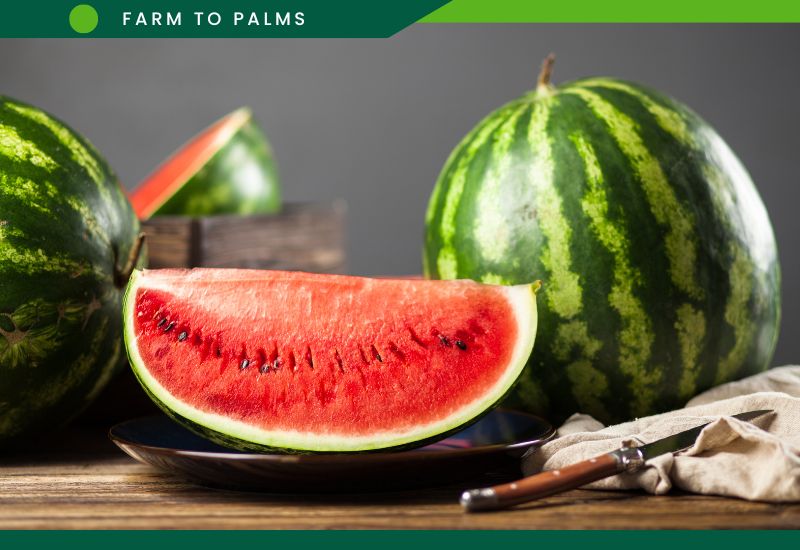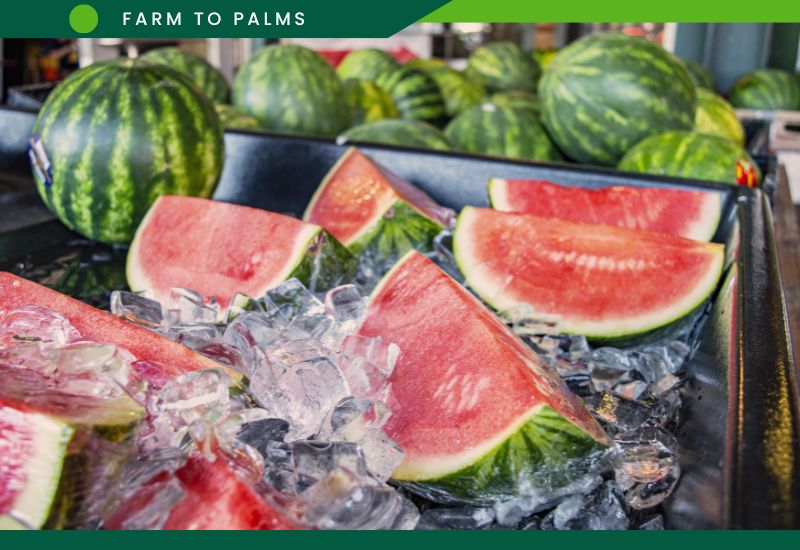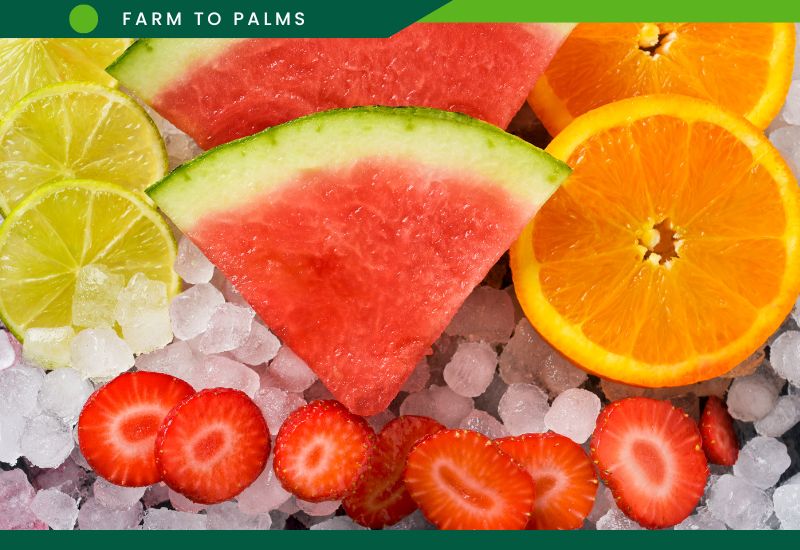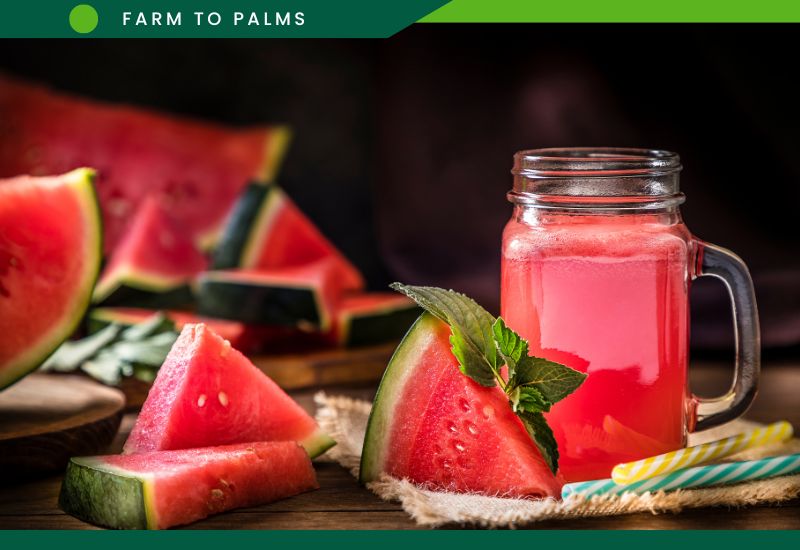Watermelon, a globally beloved fruit, is not just a refreshing treat but also a unique source of hydration. Packed with essential vitamins, minerals, and antioxidants, it stands as a treasure trove of nutrition. Despite its widespread popularity, many still need to figure out the best time to savour this fruit. This article aims to shed light on the optimal timing for watermelon consumption and its benefits when enjoyed at different times of the day.
What is the best time to eat watermelon?

Morning
This allows your body to absorb the nutrients well, especially with the high water content and vitamins. Some recommend between 10 am and 12 pm.
Afternoon
Watermelon is a refreshing summer fruit, so another option is to enjoy it as a post-lunch snack (before 5 pm) or after some activity to help replenish fluids. This avoids having it on an empty stomach, which can disrupt blood sugar levels.
Is it reasonable to eat watermelon at night?
Whether it’s reasonable to eat watermelon at night depends on your individual circumstances. If you have sensitive digestion or trouble sleeping, it might be best to avoid it close to bedtime.

However, if you don’t experience these issues, you can enjoy it in moderation as part of a balanced diet. Experiment and see how your body reacts. Here’s a breakdown of the potential pros and cons:
Pros:
- Hydration: Watermelon’s high water content (around 92%) can be a game-changer, especially in hot weather, keeping you refreshed and hydrated.
- Nutrients: You’ll still get the vitamins and antioxidants present in watermelon.
- Sweet craving: Compared to processed snacks, it can satisfy a sweet tooth without high sugar content.
Cons:
- Digestion: Some believe watermelon’s mild acidity might slow digestion during sleep.
- Frequent urination: The high water content could lead to more bathroom trips at night, disrupting sleep.
- Blood sugar: While natural sugar, some people might be concerned about blood sugar spikes before bed
- Noteworthy Potassium Content: Watermelon is renowned for its delightful taste and nutritional benefits, but its high potassium content warrants attention. Potassium is vital for cell function, yet excessive intake can result in hyperkalemia. The body generally eliminates excess potassium through urine, a less efficient process during sleep. While small amounts are usually safe, consuming significant watermelon at night may risk kidney health.
How long should I wait to drink water after eating watermelon?

Dr Das emphasized that there is no strict interval for consuming water after eating watermelon. One should drink water as needed to maintain proper hydration levels throughout the day, irrespective of the timing of watermelon consumption or other dietary intake, giving you the freedom to hydrate as you see fit.
If you have sensitive digestion or a history of heartburn, some sources suggest waiting 20-30 minutes after eating watermelon before drinking water. This is because the combination might cause temporary discomfort for some individuals.
What time is too late to eat watermelon?

Dr Shilpa Arora, a prominent nutritionist, highlights the composition of watermelons, noting their high water content, presence of lycopene, potassium, and various nutrients, as well as their fibre content aiding digestion. While watermelon is generally considered a healthy fruit, the timing of consumption is emphasized.
Dr Arora advises against eating watermelon, or any fruit, after 7 pm due to its slight acidity, which could disrupt digestion during bodily inactivity. She recommends consuming watermelon around noon to early afternoon (12-1 pm) when digestive processes are most active.
What should you not eat with watermelon?

Here are some foods that should generally not be eaten together with watermelon:
- Milk and dairy products: Watermelon has a mild diuretic effect, while milk can cause digestive issues when combined with watery fruits like watermelon. This combination may lead to indigestion, bloating, and other stomach discomforts.
- Citrus fruits: Watermelon and citrus fruits like oranges, grapefruits, and lemons have very different properties, and consuming them together may cause acid reflux or heartburn in some people.
- Cucumber: Both watermelon and cucumber have a high water content and can cause digestive distress when consumed in large quantities.
- Mashed potatoes/starches: The combination of watermelon’s high water content and starchy foods like mashed potatoes or bread can be challenging to digest and may lead to bloating or gas.
- Beans: Watermelon and beans are gas-producing foods, and consuming them together may exacerbate digestive issues.
- Alcoholic beverages: Alcohol and watermelon have a diuretic effect and may cause dehydration if consumed together.
The general rule is to avoid combining watermelon with foods high in protein, fat, or starch, as these combinations can be challenging to digest and may cause discomfort. It is best to consume watermelon alone or with light, easily digestible foods.
Conclusion
he optimal timing for consuming watermelon depends on individual preferences and dietary objectives. Watermelon is versatile and can be savoured during different times of the day, such as morning, afternoon, or evening, pre or post-workout or even as a sweet treat.
With its low-calorie content and abundant vitamins, minerals, and antioxidants, watermelon offers numerous health advantages when integrated into one’s daily eating habits. The crucial point lies in integrating watermelon into a diverse and well-rounded diet to fully capitalize on its nutritional value. Visit Farm to Palms now and elevate your nutrition with the goodness of fresh fruits and vegetables!

